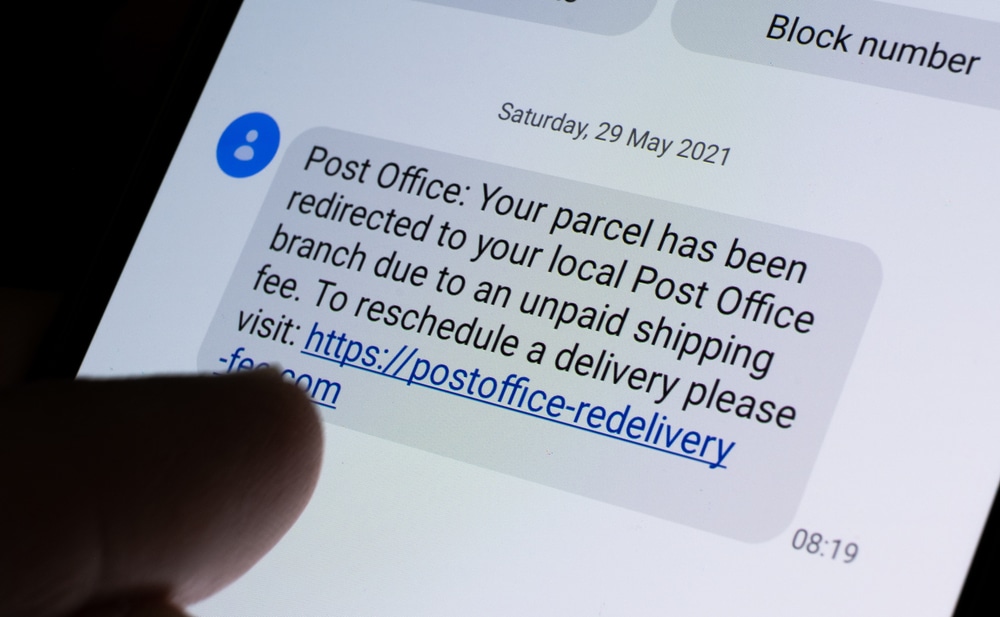Jasmine Birtles
Your money-making expert. Financial journalist, TV and radio personality.


As the festive season is fast approaching, most people will be thinking about how they’re going to spend Christmas and what they need to do to prepare for the big day and celebrations over the break. But it is important to be wary of scams.
There are others out there who will be preparing for Christmas in a much different way.
Criminals see Christmas as a big opportunity to cash in on people’s generosity and irregular travel patterns, as homes are often left unoccupied, but full of gifts during the lead up to the 25th of December.
There is nothing worse than being ripped off or scammed over the holidays so we’re going to tell you about the 12 scams of Christmas, including some of the most common tricks criminals use over the festive period to get their hands on your money.
As more and more high street retailers announce closures, online sales are climbing as increasing numbers of consumers are deciding to buy on the internet instead.
Cyber Monday and Black Friday are expected to see significant increases on 2017 as the four day period is the biggest spending period of the year.
Unfortunately, criminals know about the amount of money spent online and build fake websites to catch unsuspecting consumers.
Many websites are built to look identical to the most famous and well-known brands in order to trick people into spending money, only to receive no goods after sending payment.

Everybody knows that a huge number of fake goods are bought and sold as counterfeit; shoes, handbags, coats and electronics flood the market over the festive season.
Second-hand selling platforms such as Ebay and Gumtree are often full of deals that seem too good to be true, and they often are.
If you see a high value item listed for a tiny price, the probability of it being an original is extremely small so try to avoid getting tricked into spending money on fake goods.
Elderly people are targeted over Christmas as they are often not as savvy online as younger people.
One of the most common scams is the ‘injured family member’ trick.
Scammers will call up an elderly person and pretend to be a doctor in a foreign country, telling the target that their son, daughter or grandchild, has been hurt and they require funds in order to carry out critical medical care.
In a state of panic, many concerned relatives will provide their card details, unsuspecting they are being tricked into sending hundreds of pounds to a criminal.

For many people, Christmas can be a lonely period if they do not have a family or close group of friends.
Unfortunately, criminals see this as an opportunity to make money and so use social media to set up fake profiles and begin chats with people who they believe are susceptible to being tricked.
One person may run a number of accounts and get people from all over the UK to send them money to ‘travel’ to visit over the holidays.
As high streets across the UK fill up over the holiday period, charities do their best to capitalise on the added traffic by placing fund raising staff all over city centres.
Unfortunately, scammers try to make money of their own by popping on a high visibility jacket and a bucket to collect coins.
There has been a big clamp down in recent years as fund raisers will often look to get a direct-debit set up instead of asking for cash, so if you find yourself being asked for coins or paper money, that may be a sign of a fake charity fundraiser.

Due to the fact that a huge number of confirmation emails are sent to customers in December, fake companies will send their own, claiming that a refund is due or payment failed and it needs to be processed again.
Unfortunately, many people are so panicked that presents for the family won’t arrive, they’ll process a payment again, unaware it’s a scam.
The Guardian recently reported that thousands of students were targeted by a tax refund scam but the problem is much wider than that.
People all over the UK receive similar emails, apparently from HMRC, stating they are due a tax refund.
The emails request bank details for the funds to be deposited, however, instead of putting money into accounts the scammers take it out.

A huge number of temporary jobs become available over the festive period as retail businesses require extra resource during the busiest time of the year.
However, there are also a number of jobs which are advertised as great opportunities that pay extremely well.
In the run up to Christmas, many people may be looking out for ways to make more money and be drawn towards positions that promise massive wages, however, advertising the application can often act as a way to capture personal details including banking information, which can be used to withdraw funds.
A lot of people travel over Christmas and taxi drivers are well aware of how desperate people are to get to their hotels or back home from train stations and airports, placing huge fees on their meters before the car has even moved.
Some drivers may also take significantly longer routes if it’s obvious that their passengers don’t know the local area.
Drivers who are looking to exploit visitors may ask ‘Is this the first time you have been to this city?’ as a way of finding out whether they can get away with taking a longer route.
Digital scams come in all shapes and sizes over the summer and during the festive season, you may receive an email from Santa.
The message is often hidden and a message will ask a recipient to download the message to receive a free gift, which is more often than not a nasty virus.
You might fall victim to the restaurant flyer scam, the menu for a non-existent eatery shoved under the door resulting in an order that gets you robbed, or it could be the front desk scam where you get a call after check-in asking for another credit card number because “the one you provided was rejected.”

Just like the message from Santa trick, you may receive an email which is apparently from a member of your family.
The message may say something along the lines of, ‘Your uncle has sent you a Christmas E-Card! Click the link to receive his message and gift!’
Once more, the download could be a nasty virus which may leak personal information to criminals.
To learn what other tactics may be used over the next few months, check out some of our other dedicated articles.
Common scams students should be aware of
Top 11 Holiday Rip-Offs and Scams
Seasonal Money Scams on the Internet

Always beware of scams especially at Christmas